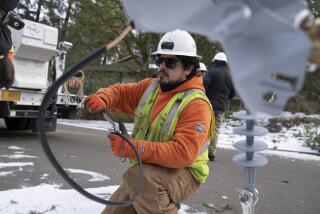Bernanke says Fed might slowly remove stimulus as hiring improves
WASHINGTON -- Federal Reserve Chairman Ben S. Bernanke said Wednesday that the central bank might gradually ratchet back its stimulus efforts if the labor market continues to improve, before completely pulling the plug on the unprecedented effort.
The Fed has said it would continue purchasing $85 billion in bonds until there is substantial improvement in the labor market.
Federal Reserve policymakers said Wednesday that moderate economic growth has returned after a slowdown at the end of last year and the employment situation has improved.
But the improvements were not enough to stop the stimulus efforts, which also include keeping short-term interest rates near zero.
Still, Bernanke talked extensively at his quarterly news conference about how the Fed might start rolling back its efforts.
“When we see that the …. situation has changed in a meaningful way, then we may well adjust the pace of purchases,” he said.
The Fed would look at a range of labor market indicators, including the unemployment rate and weekly jobless claims, before making any changes. And if it did reduce the size of its monthly bond purchases, the Fed would stand ready to increase the level back up to $85 billion if conditions started to worsen.
“The point of this is to let the market see our behavior, to let them see how respond to changes in the outlook,” Bernanke said.
He noted that the job market has improved in the last several months.
The economy added 236,000 net jobs in February and the unemployment rate fell to 7.7%, the lowest level since the end of 2008.
Bernanke noted that private sector payrolls have been growing an average of 200,000 jobs a month over the last five months, the unemployment rate has dropped by 0.4 percentage points since September, and weekly jobless claims have recently been at their lowest level since before the financial crisis.
But he also said some earlier improvements in the labor market have been short-lived as the economy has struggled to recover from the Great Recession.
“One thing we would need is to make sure, this is not a temporary improvement,” he said. “We’ll need to see sustained improvement. One month, two months doesn’t cut it.”
Bernanke said he was attuned to the problems of average Americans who are out of work.
When asked the last time he had spoken to someone who was unemployed, Bernanke said he had talked to a relative recently who does not have a job. He also noted his hometown in South Carolina has a very high unemployment rate and his childhood home there was recently foreclosed.
“I have great concern about the unemployed, both for their own sake but also for the loss of skills, the loss of labor force attachment [which] is bad for our whole economy,” he said
“I think it’s very, very important that we act to address unemployment and I think most people would agree the Federal Reserve has been fairly active in that regard,” Bernanke said.
ALSO:
Hiring picks up as housing market recovers
U.S. economy improving faster than expected, data show
Fed says moderate growth has returned, will stay course on stimulus
More to Read
Inside the business of entertainment
The Wide Shot brings you news, analysis and insights on everything from streaming wars to production — and what it all means for the future.
You may occasionally receive promotional content from the Los Angeles Times.










